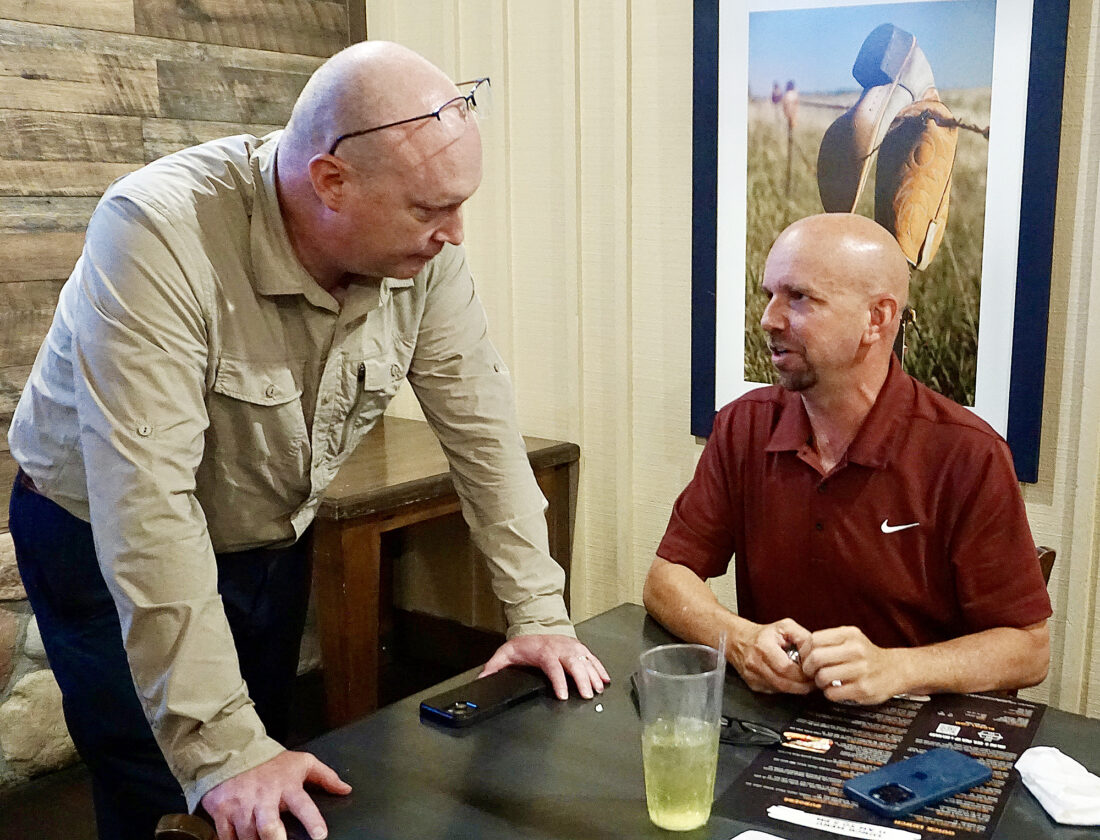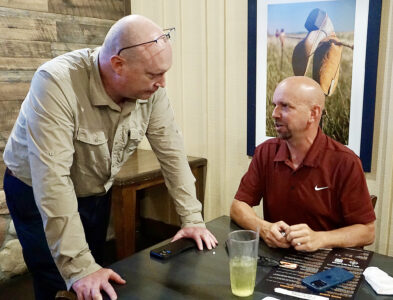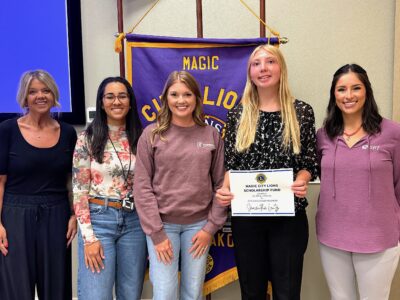State-imposed tax cap creates challenge for some entities

Jill Schramm/MDN Minot City Manager Harold Stewart, left, stops to talk with Scott Louser, a member of the Minot School Board, following the local government liaison committee meeting Thursday.
A new state-imposed requirement to limit property tax increases to no more than 3% is putting some local taxing entities in a bind.
“It’s challenging,” Minot City Manager Harold Stewart said at a local government liaison committee meeting Thursday. He said he plans to present a 2026 budget to the Minot City Council that captures the full 3%.
“That includes eliminating some positions. We’re cutting budgets across the organization in training and travel and projects and replacement of equipment and all kinds of things,” he said.
Without money to match a grant to hire more firefighters to meet national standards, Minot will see its fire rating downgraded next year, raising insurance costs for property owners, Stewart said.
In drafting a 2026 budget, city administration also looked at frameworks for 2027 and 2028 budgets.
“With adjustments this year, we can make it work. Again, there’s going to be some elimination, some cuts,” Stewart said. “I think next year will be fairly stable. But then in 2028, it gets pretty ugly. And we’re also dipping into our reserves significantly to help balance out some of this. Over time, that’s not going to be sustainable, either, because pretty soon, we’re not going to have reserves, or we’re going to be at minimum, and that 3% cap is going to barely keep up with inflation.”
A 3% increase amounts to about $790,000 in revenue, Stewart said.
With the city’s commitment to flood control and the Northwest Area Water Supply project, financial flexibility is limited, he said.
“Pretty much all capital projects are going to cease until we have the financial flexibility with those projects coming off of our plates to be able to do anything more in the future. But we’re going to be paying for flood control for the next 40 years. Forty years is a long time to go without making any other infrastructure improvements within our community,” he said.
Stewart said many legislators intended the caps to encourage political subdivisions to make cuts, but they might not have intended the consequences that are coming.
“Most of us have been pretty lean for a while, and those cuts are going to have significant impacts going forward,” he said. “The 3% increase in property tax over the future years isn’t even enough to maintain status quo going forward.”
Laura Dokken, Minot Public Schools business manager, said the financial report for the fiscal year that ended June 30 is being evaluated. However, she said, the school district also could be looking at a 3% tax increase for 2026.
She said the federal funding situation is equally significant.
“We’ve issued contracts based on federal funding, and if that doesn’t come into being, we’ll be in a really tight spot for at least a year until we can correct that part of it,” Dokken said. “We’re pretty lean in some areas. We don’t have a building fund. We had a huge issue at one of our elementary schools that got flooded over the Fourth of July, so I think we need reserves, and this cap is starting to limit having those reserves in our school district.”
Park Board member Mike Schmitt said the board approved a preliminary budget Tuesday that uses only a fraction of the allowed 3% increase, but the district will be in maintenance mode with projects. The district plans to levy for only 0.62% of the amount that the full 3% increase would generate.
Ward County Auditor/Treasurer Marisa Haman said a 3% increase generates around $670,000 for the county. It still leaves the county commission in need of finding $1.6 million in cuts to budget requests to stay below the 3%.
“We don’t have a large reserve. We are already trying to be pretty lean,” Haman said. “I’m not quite sure yet how we’re going to get to the 3% or if it’s going to be less than that, but I think it will be a challenge for sure.”
Scott Louser, a Minot Public School Board member and Republican state legislator, said it is important that legislators hear about the impact of the cap from political subdivisions before going back into session in January 2027.
“We need to double down on advocacy down in Bismarck,” he said. “I’m hearing people say we have a problem we have to address. Nobody here has said this isn’t right or this isn’t fair. You’re saying we understand it; now we have to find cuts. But when those cuts happen, the legislators making these decisions have to hear what the impact was in our community.”



